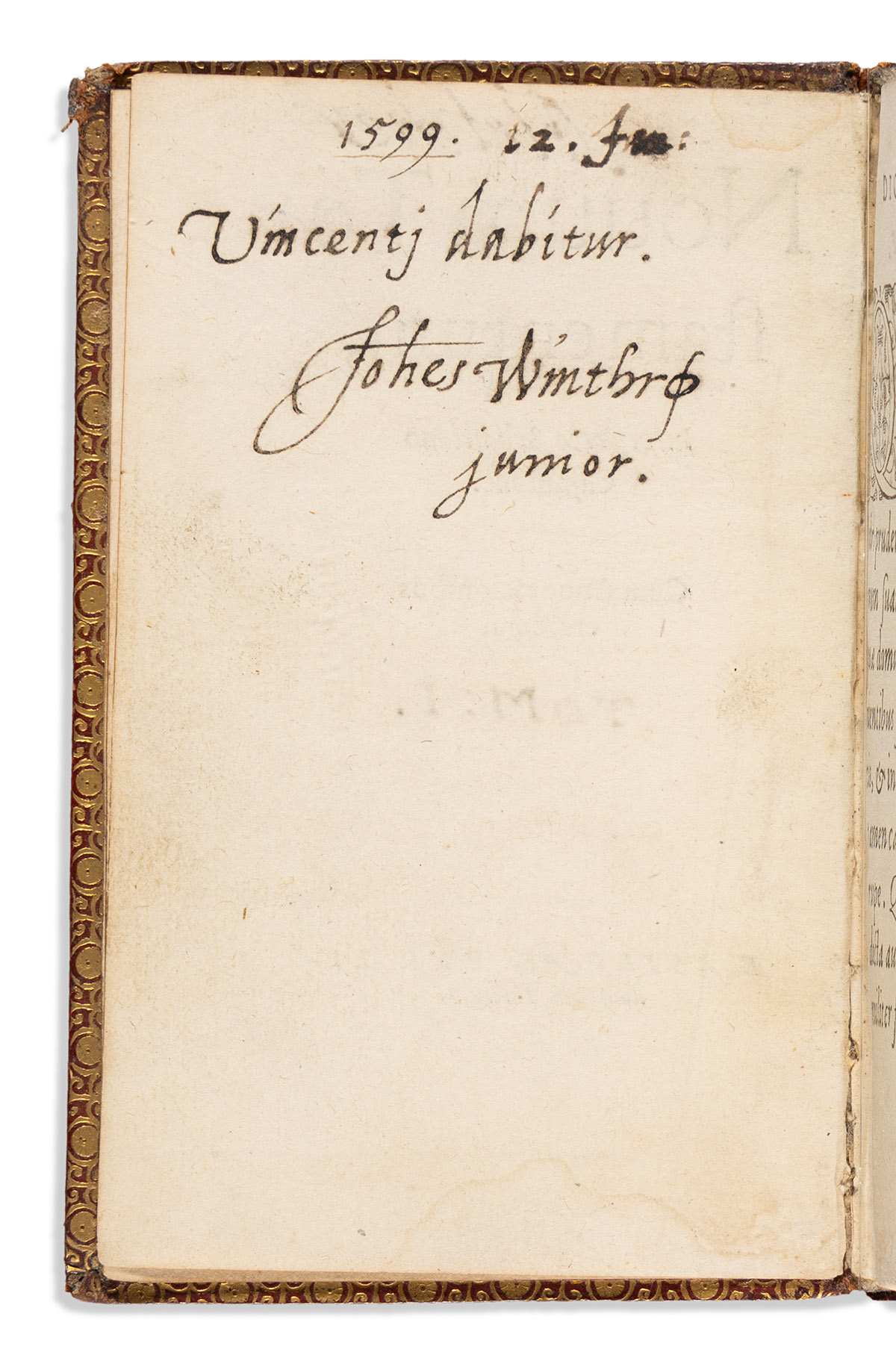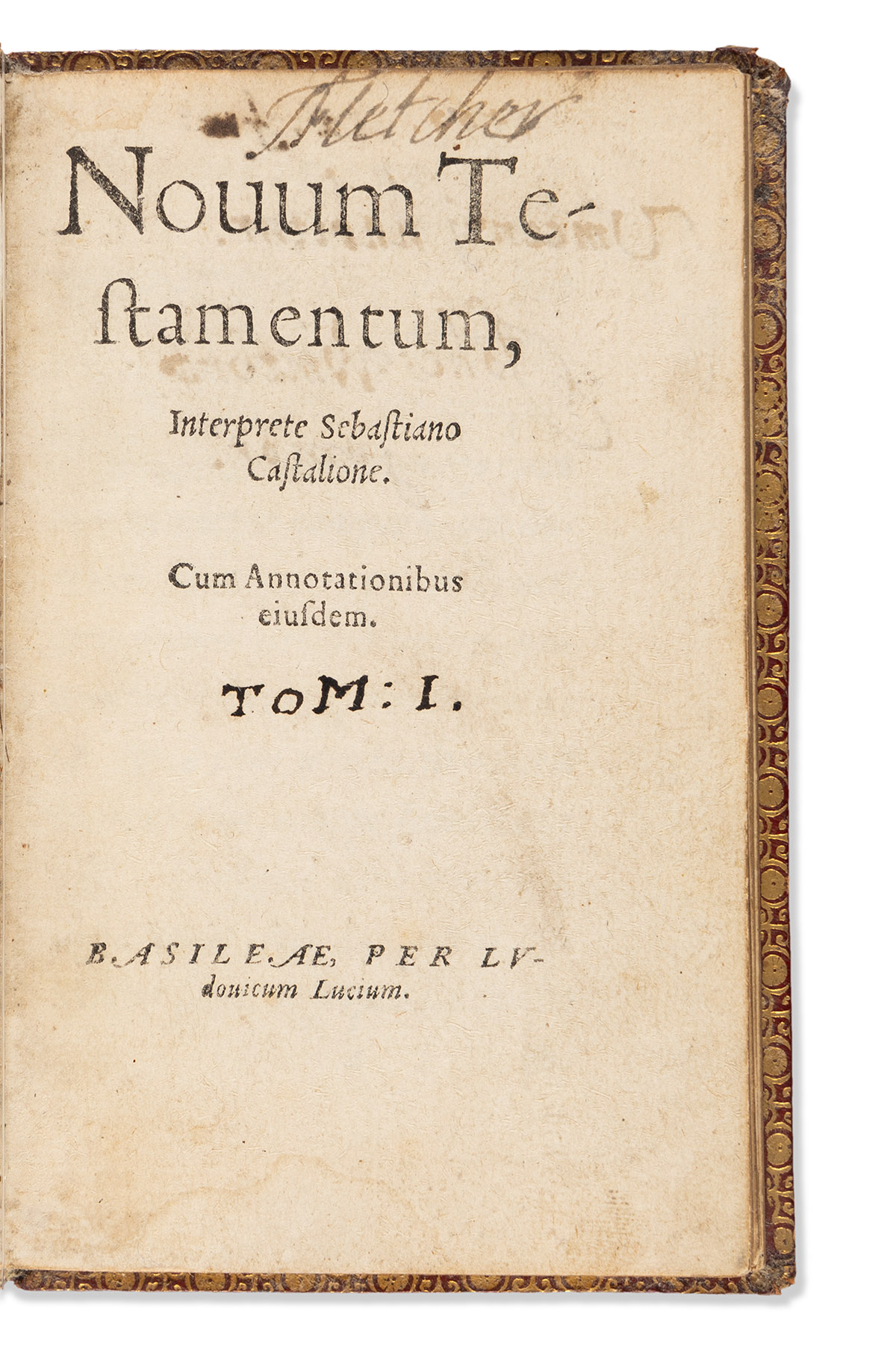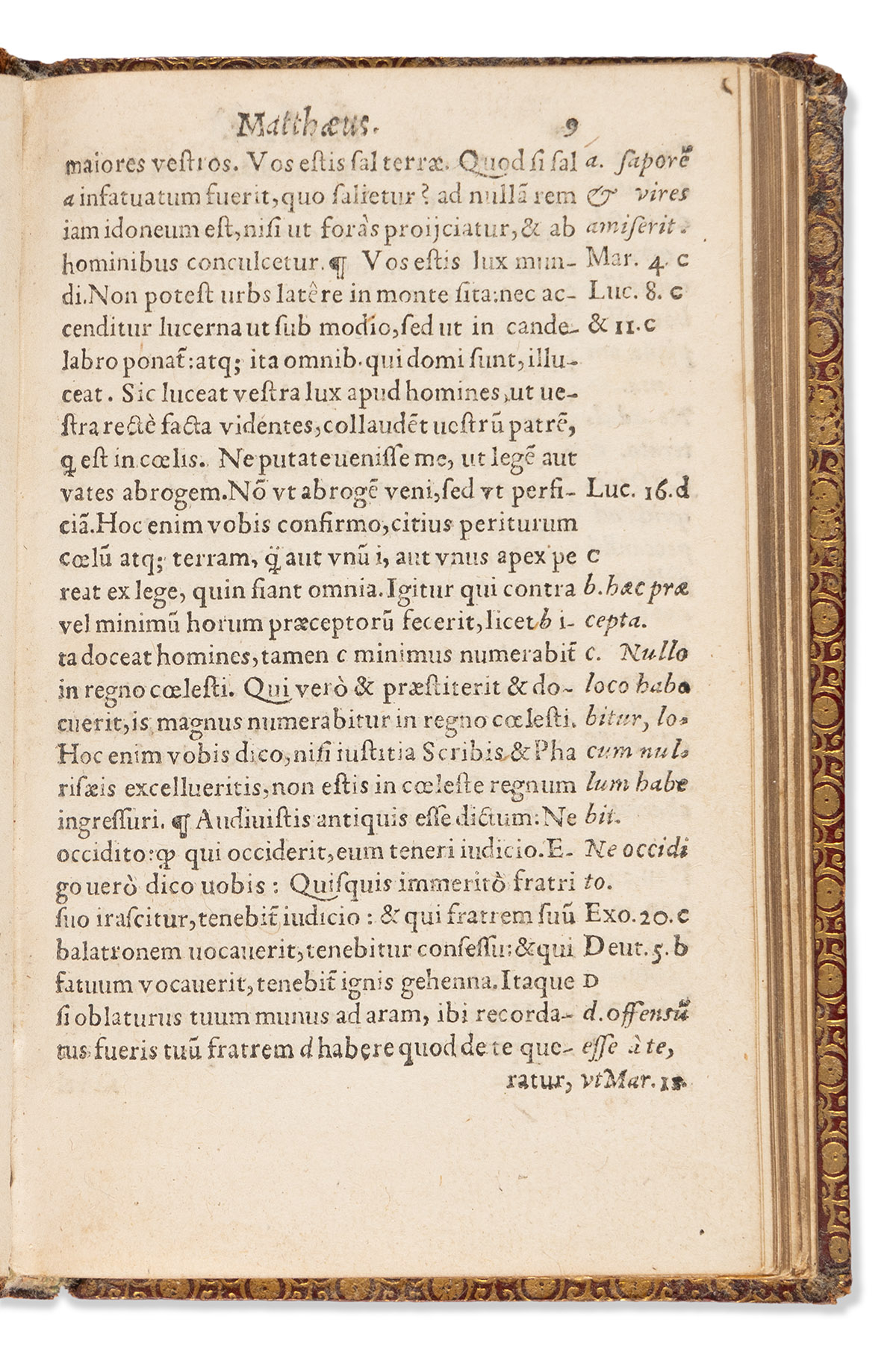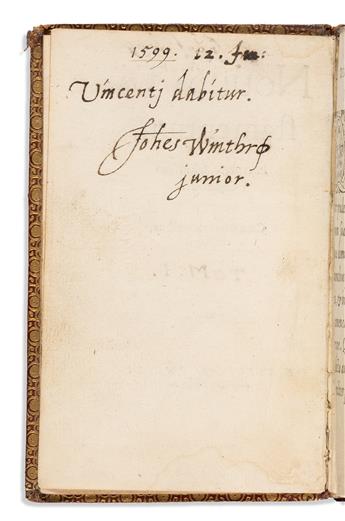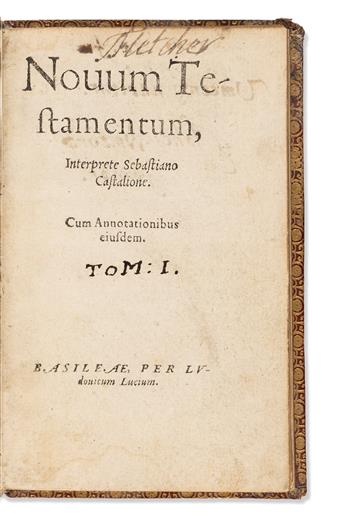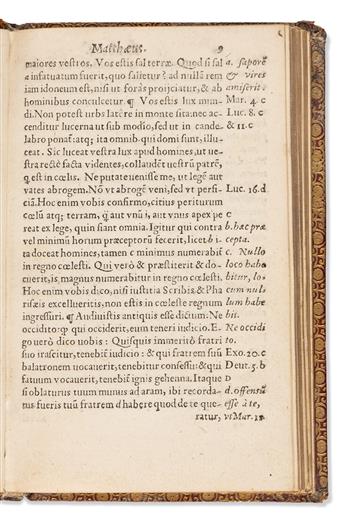Sale 2646 - Lot 59
Price Realized: $ 13,000
Price Realized: $ 16,250
?Final Price Realized includes Buyer’s Premium added to Hammer Price
Estimate: $ 3,000 - $ 4,000
(BIBLE IN LATIN.) Partial New Testament given to John Winthrop as a 12th-birthday gift by his father in 1599. titled "Novum Testamentum, Interprete Sebastiano Castalione." [4], 288 (of 647) pages. 16mo, early gilt calf with spine title "Iv Evang," minor wear; minimal dampstaining in lower margin, lacking leaves O2-7 (Luke XX-XXIII) and pages 289-647; all edges gilt; inscribed on verso of title page "1599 12 Jan: Vincenti dabitur. Johes Winthrop junior," with later owners' inscriptions on title page, rear flyleaf, and rear pastedown. Basel: Ludovicum Lucium, [1556]
Additional Details
John Winthrop was a key leader of the Massachusetts Bay Colony. Before Arriving in the New World in 1630, Winthrop wrote a sermon on a passage from the Sermon on the Mount, Matthew 5:14, "a city on a hill cannot be hid," and warned that "as a city upon a hill, the eyes of all people are upon us"--that the Puritan faith of the colonists would be watched carefully by the world.
Offered here is the New Testament presented to John Winthrop by his father Adam upon his 12th birthday in 1599/1600. The inscription on verso of the title page reads "1599 12 Jan: Vincenti dabitur. Johes Winthrø junior." The Latin translation of Matthew 5:14 can be seen on page 9: "Non potest urbs latere in monte sita." John matriculated at Trinity College, Cambridge, in 1603. This slim volume apparently did not make the journey across the Atlantic with him in 1630.
The handwriting is a close match for that of Adam Winthrop (1548-1623), an affluent English textile merchant best known as the father of Massachusetts Bay Colony founder John Winthrop. We have traced two other books with Adam Winthrop inscriptions which closely resemble this one. In 1600, he inscribed a copy of Jean Pillot's 1563 book "Gallicae Linguae Institutio" (now held by the New York Society Library) with a nearly identical instance of the "Vicenti dabitur" motto, and the same underlined year at the head of the inscription. While its "A Wintropp" signature is not a close match, below that he signed in a fainter hand "Adam Winthrø" which closely resembles the New Testament inscription. Additionally, a copy of "A New Almanack, or Annuall Calender … for this Yeare of Our Lord 1620" held by held by the Massachusetts Historical Society bears a 1620 inscription by Adam Winthrop to his grandson, which also has the underlined year at the head of the inscription, and close similarities in the orthography. The numerous Winthrop family book inscriptions have been studied in an article by Richard Calis et al., "Passing The Book: Cultures of Reading in the Winthrop Family, 1580–1730," in Past & Present 241:1 (November 2018), pages 69–141, which includes an illustration of the 1620 inscription.
The "Vincenti dabitur" motto translates roughly to "It shall be given to the conqueror." Adam Winthop inscribed at least two other books thus: the "Gallicae Linguae Institutio" discussed above, and a copy of John Jewel's "Defense of the Apologie of the Churche of Englande" held by Princeton University which he inscribed in 1694 (cited in "Passing the Book").
The inscription to John Winthrop Junior bears a note of explanation. Adam's son John Winthrop (1587/8-1649), later founder and governor of Massachusetts, is more often known to historians as John Winthrop Sr.; his son John Winthrop (1606-1676), a governor of Connecticut, is often known as Junior or "the Younger." In January 1599/1600, the future Massachusetts founder was just twelve years old, and was the youngest John in his extended family--his uncle John Winthrop (1546-1613), then resident in Ireland, would have been known as "Senior."
This New Testament is a Latin translation by Sebastian Castellio, first published in 1551. Castellio was a French theologian and a close associate of John Calvin. He is seen as an early advocate of the separation of church and state, and of limited government, which led to his split with Calvin in 1553. Nonetheless, his Bible translations went through several editions. The present volume is a portion of a 1556 printing of the New Testament, which was issued with 647 pages. It was rebound into two volumes; offered here is the first volume, containing only the four gospels. 6 leaves are missing from Luke.
The volume was later owned by the Scottish politician and bibliophile Andrew Fletcher of Saltoun (1655-1716), who signed "Fletcher" on the title page and rear pastedown. He may have added the manuscript list of citations on the rear flyleaf.
A remarkable artifact from the childhood of one of the seminal figures of the American colonies.
Offered here is the New Testament presented to John Winthrop by his father Adam upon his 12th birthday in 1599/1600. The inscription on verso of the title page reads "1599 12 Jan: Vincenti dabitur. Johes Winthrø junior." The Latin translation of Matthew 5:14 can be seen on page 9: "Non potest urbs latere in monte sita." John matriculated at Trinity College, Cambridge, in 1603. This slim volume apparently did not make the journey across the Atlantic with him in 1630.
The handwriting is a close match for that of Adam Winthrop (1548-1623), an affluent English textile merchant best known as the father of Massachusetts Bay Colony founder John Winthrop. We have traced two other books with Adam Winthrop inscriptions which closely resemble this one. In 1600, he inscribed a copy of Jean Pillot's 1563 book "Gallicae Linguae Institutio" (now held by the New York Society Library) with a nearly identical instance of the "Vicenti dabitur" motto, and the same underlined year at the head of the inscription. While its "A Wintropp" signature is not a close match, below that he signed in a fainter hand "Adam Winthrø" which closely resembles the New Testament inscription. Additionally, a copy of "A New Almanack, or Annuall Calender … for this Yeare of Our Lord 1620" held by held by the Massachusetts Historical Society bears a 1620 inscription by Adam Winthrop to his grandson, which also has the underlined year at the head of the inscription, and close similarities in the orthography. The numerous Winthrop family book inscriptions have been studied in an article by Richard Calis et al., "Passing The Book: Cultures of Reading in the Winthrop Family, 1580–1730," in Past & Present 241:1 (November 2018), pages 69–141, which includes an illustration of the 1620 inscription.
The "Vincenti dabitur" motto translates roughly to "It shall be given to the conqueror." Adam Winthop inscribed at least two other books thus: the "Gallicae Linguae Institutio" discussed above, and a copy of John Jewel's "Defense of the Apologie of the Churche of Englande" held by Princeton University which he inscribed in 1694 (cited in "Passing the Book").
The inscription to John Winthrop Junior bears a note of explanation. Adam's son John Winthrop (1587/8-1649), later founder and governor of Massachusetts, is more often known to historians as John Winthrop Sr.; his son John Winthrop (1606-1676), a governor of Connecticut, is often known as Junior or "the Younger." In January 1599/1600, the future Massachusetts founder was just twelve years old, and was the youngest John in his extended family--his uncle John Winthrop (1546-1613), then resident in Ireland, would have been known as "Senior."
This New Testament is a Latin translation by Sebastian Castellio, first published in 1551. Castellio was a French theologian and a close associate of John Calvin. He is seen as an early advocate of the separation of church and state, and of limited government, which led to his split with Calvin in 1553. Nonetheless, his Bible translations went through several editions. The present volume is a portion of a 1556 printing of the New Testament, which was issued with 647 pages. It was rebound into two volumes; offered here is the first volume, containing only the four gospels. 6 leaves are missing from Luke.
The volume was later owned by the Scottish politician and bibliophile Andrew Fletcher of Saltoun (1655-1716), who signed "Fletcher" on the title page and rear pastedown. He may have added the manuscript list of citations on the rear flyleaf.
A remarkable artifact from the childhood of one of the seminal figures of the American colonies.
Exhibition Hours
Exhibition Hours
Aliquam vulputate ornare congue. Vestibulum maximus, libero in placerat faucibus, risus nisl molestie massa, ut maximus metus lectus vel lorem.



